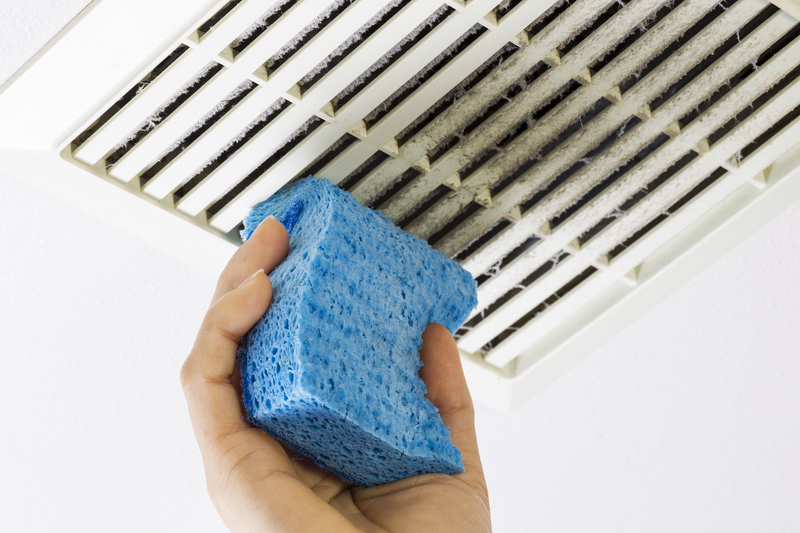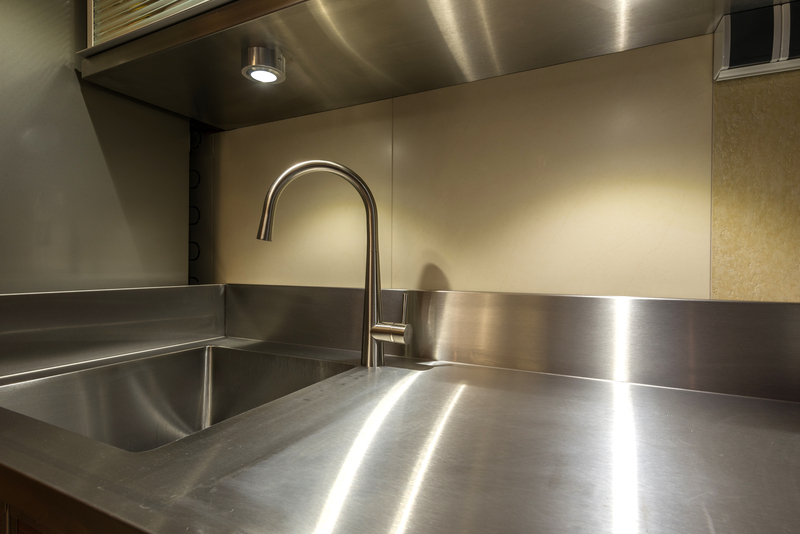Remove Unwanted Pet Odors for a More Welcoming Home
Posted on 02/09/2025
Remove Unwanted Pet Odors for a More Welcoming Home
For millions of pet owners, pets are cherished members of the family. However, even the most adorable companions can occasionally leave behind unpleasant pet odors that can overwhelm the senses and reduce the comfort of your sanctuary. Whether it's a lingering smell from litter boxes, unexpected accidents, or general animal aroma, effectively eliminating pet odors is crucial for a fresh, inviting living space. This comprehensive guide will explore proven strategies, innovative products, and established routines to help you remove unwanted pet odors and create a healthier, happier home for everyone.
Understanding the Sources of Pet Odors
Before you can remove pet odors successfully, it's important to identify their origins. Uncovering the root of the smell will enable you to target treatments effectively and prevent recurrence.
Main Sources of Unpleasant Pet Odors:
- Urine Accidents: Both dogs and cats may have accidents on carpets, rugs, upholstery, or floors, leaving behind persistent odors.
- Litter Boxes: Cat litter, if not frequently changed, can emit strong ammonia-like smells.
- Wet Fur: Pets who go outside or play in water may develop a soggy, musty "wet dog" or "wet fur" odor.
- Saliva and Dander: Natural animal oils, drool, and skin flakes can seep into fabrics or build up in corners.
- Pet Beds and Toys: Soft furnishings and plush toys absorb pet aromas over time.
Tip: Routine grooming, house cleaning, and air circulation can reduce the risk of lingering pet smells.

Best Practices for Removing Unwanted Pet Odors
Combatting pet-related smells in your home requires a multifaceted approach. Implement these best practices to neutralize pet odors and foster a more welcoming environment.
1. Clean Accidents Promptly and Thoroughly
The faster you address pet accidents, the easier it will be to prevent stains and odors from becoming permanent.
- Blot, Don't Rub: Use a clean, absorbent cloth to soak up as much urine or liquid as possible. Rubbing can spread the stain and push odors deeper into fibers.
- Enzyme-Based Cleaners: These cleaners break down organic matter at the molecular level, eliminating odor sources instead of masking them.
- Avoid Ammonia-Based Products: Ammonia smells similar to urine, which may encourage repeat accidents, especially in cats.
2. Wash Soft Furnishings Regularly
Pet odors embed themselves in fabric items such as bed covers, curtains, and soft rugs. Routine washing is essential:
- Wash removable covers, blankets, and beds using hot water and a pet-safe detergent.
- Add a cup of white vinegar to the rinse cycle to help eradicate stubborn odors.
- Sun-dry whenever possible - sunlight acts as a natural deodorizer and bacteria-killer.
3. Deep Clean Carpets and Upholstery
Fabrics and carpets act like sponges, holding onto pet smells. Consider these options for recurring issues:
- Steam Cleaners: Hot steam penetrates deep into fibers, loosening and removing dirt, bacteria, and odor molecules.
- Baking Soda: Sprinkle generously on carpets, let sit overnight, and vacuum thoroughly to neutralize lingering pet odors.
- Professional Services: Schedule a professional deep clean at least once a year, or more often in multi-pet homes.
4. Maintain Litter Boxes and Pet Toilets
Consistent, proactive litter box care is vital for eliminating cat odors and preventing offensive smells.
- Scoop waste daily and replace litter entirely at least once a week.
- Wash the litter box with mild soap and water (avoid harsh chemicals that may deter your cat).
- Consider covered or self-cleaning litter boxes to contain smell and scatter.
Odor Control Solutions: Natural vs. Commercial Products
Choosing the right techniques and products determines the effectiveness of your pet odor removal efforts. Weigh the benefits of natural remedies and commercial solutions:
Natural Deodorizers
- Baking Soda: Absorbs and neutralizes strong odors in carpets, couches, and pet bedding.
- White Vinegar: Helps break down urine and neutralizes lingering aromas on hard surfaces.
- Lemon Juice: Antimicrobial and pleasantly scented - great for wiping down litter boxes or hard floors.
- Activated Charcoal: Place sachets in rooms or closets to absorb airborne pet smells.
Commercial Pet Odor Eliminators
- Enzymatic Sprays: Target tough, protein-based stains and persistent odors with powerful enzymes.
- Odor-Neutralizing Candles or Sprays: Specially designed for homes with pets, these neutralize rather than cover up smells.
- Antibacterial Cleaners: Disinfect areas prone to accidents and destroy odor-causing bacteria.
Always select pet-friendly products to ensure your home remains safe for furry residents and human family members alike.
Preventing Future Pet Odors: Proactive Strategies
The most effective way to create a welcoming, odor-free home is through prevention. Incorporate these proactive steps into your daily and weekly routines:
1. Groom Your Pets Regularly
- Bathe dogs and brush cats as recommended by veterinarians to minimize dander, loose hair, and oil buildup.
- Wipe paws and fur after outdoor walks to reduce tracked-in smells.
2. Designate Pet Zones
- Use washable rugs and mats in high-traffic pet areas for easier cleaning.
- Train pets to stay off furniture and beds, or use washable slipcovers if they do jump up.
3. Focus on Air Quality
- Open windows regularly to circulate fresh air throughout your home.
- Invest in HEPA air purifiers to trap pet hair, dander, and odor particles.
- Change HVAC filters frequently to prevent the buildup of pet-related debris.
4. Routine Home Cleaning
- Vacuum carpets, upholstery, and pet beds at least twice a week using a vacuum with a HEPA filter.
- Mop floors regularly using a pet-safe cleaning solution.
- Don't forget to clean under furniture, baseboards, and hard-to-reach corners, which can harbor invisible pet odors.
Case Study: Transforming an Odor-Affected Home
Meet the Lee Family: After adopting two rescue cats and a young dog, the Lees began to notice a persistent 'pet smell' that no amount of air freshener could mask. With a toddler in the house, they were determined to create a clean, fresh environment without giving up the joy of their furry friends.
- After identifying the main odor sources (carpeted areas and an old litter box), the Lees invested in a quality enzyme cleaner and began a strict daily cleaning schedule.
- They deep cleaned all carpets, washed pet bedding, and started using an air purifier with a carbon filter.
- Switching to a covered, self-cleaning litter box and scooping twice daily further reduced odor issues.
Within a week, the pet odor was completely gone. Friends and family commented on how fresh and welcoming their home now felt - proving that with diligence, the most persistent unwanted pet smells can be conquered.
What Not to Do: Common Mistakes in Pet Odor Removal
Many homeowners unknowingly make errors that only compound the odor issue. Avoid these common pitfalls:
- Using Harsh Chemicals: These may irritate pets and humans, mask the problem, or encourage repeat accidents (especially with ammonia-based products).
- Relying Solely on Air Fresheners: Candles and sprays may cover up the smell temporarily, but won't address the root cause.
- Ignoring the Source: Persistent, unaddressed stains will not go away - address every accident promptly and thoroughly.
- Neglecting Ventilation: Poor air circulation traps odors and encourages them to linger.
Special Considerations for Multiple Pet Households
Homes with several pets are often more susceptible to embedded animal smells. Here's how to multiply your freshness:
- Increase cleaning frequency of litter boxes, bedding, and play areas.
- Separate feeding and sleeping zones to contain food and fur-related odors.
- Schedule periodic professional cleanings as a reset for your home.
Remember, consistent cleanliness is the strongest defense against even the most challenging combinations of pet living arrangements.
When Professional Help is Needed
If you've tried multiple strategies and still can't remove lingering pet odors, it may be time to seek professional assistance.
- Odor-removal specialists can identify hidden sources (like subflooring or wall cavities) and employ industrial-grade deodorizers.
- Veterinarians can rule out medical causes, such as urinary tract infections, that may increase the frequency or intensity of pet accidents.
- Behavioral trainers can help address repeated marking or housetraining challenges.

Final Thoughts: Enjoy a Fresh, Pet-Friendly Home
Pet ownership doesn't mean you have to live with bad pet smells. By removing unwanted pet odors promptly, maintaining a thoughtful cleaning routine, and embracing both natural and commercial odor-control solutions, you'll create a pleasant, inviting sanctuary where pets and people can thrive together.
Here's to a welcoming home -- free from unwelcome pet odors and full of love!
Frequently Asked Questions (FAQ) on Pet Odor Removal
- Q: What is the best way to remove urine odor from carpet?
A: Use an enzyme-based cleaner, blot the area thoroughly, and avoid steam cleaning until the enzyme has fully broken down the odor molecules. - Q: How can I prevent my home from smelling like a litter box?
A: Clean litter boxes daily, change litter weekly, and use a high-quality clumping litter to minimize smell. - Q: Are air purifiers effective for pet odors?
A: Yes, air purifiers with HEPA and activated carbon filters significantly reduce airborne particles and pet-related smells. - Q: Can natural products really eliminate pet odors?
A: Baking soda, white vinegar, and activated charcoal are highly effective and safe when used correctly for many types of odor problems.
Key Takeaways
- Identify and address odor sources early.
- Adopt a consistent, thorough cleaning approach for accident spots and pet areas.
- Use a blend of natural and commercial odor-eliminating solutions.
- Focus on prevention, air quality, and routine grooming.
- Seek help if stubborn odors persist for a truly fresh, pet-friendly home.
Start your journey toward a fresher, more welcoming home today by tackling unwanted pet odors with confidence!
Latest Posts
Transform Your Treasures with Jewellery Cleaning Methods
The Ultimate Guide to Streak-Free Window Care
Key Steps for Tenants: End of Tenancy House Cleaning
Achieve Flawless uPVC Window Frames with These Tips
From Shrink to Chic: The Secrets of Maintaining Sofa Cover Size




